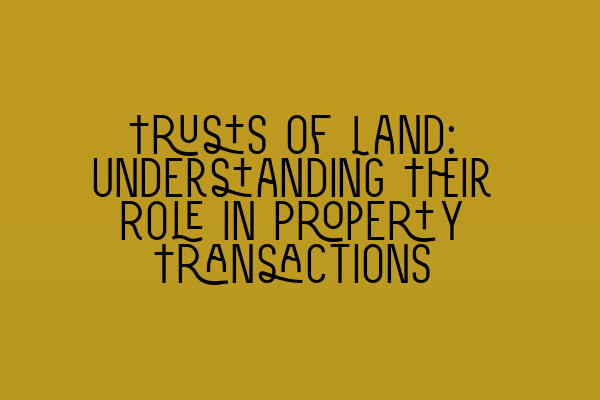Trusts of Land: Understanding Their Role in Property Transactions
In the world of property law, there are various aspects and intricacies that must be carefully considered. One such aspect is the concept of trusts of land, which plays a fundamental role in property transactions. Whether you are a solicitor, property buyer, or simply someone interested in deepening their understanding of property law, this blog post aims to shed light on the importance and intricacies of trusts of land.
What is a Trust of Land?
Before delving into the details, let’s start by understanding what a trust of land actually is. At its core, a trust of land is a legal arrangement where a property is held by one person (the trustee) for the benefit of another (the beneficiary). The trustee becomes the legal owner of the property while the beneficiary holds the beneficial interest. This arrangement ensures that the property is managed and used in a manner that aligns with the beneficiary’s interests.
Trusts of land can arise in various situations, including family property ownership, joint purchases, and investments. They serve as a mechanism to ensure fair and equitable management of property, especially in cases where multiple parties are involved. The legal framework surrounding trusts of land is primarily governed by the Trusts of Land and Appointment of Trustees Act 1996.
Roles and Responsibilities
In a trust of land, there are distinct roles and responsibilities for the trustee and the beneficiary. Let’s delve into each role in detail:
1. Trustee: The trustee is the legal owner of the property and holds the responsibility of managing it in the best interests of the beneficiary. This includes maintaining the property, paying relevant expenses, and making any necessary decisions regarding the property. The trustee is expected to exercise due diligence and act in accordance with the terms of the trust and their fiduciary duty towards the beneficiary.
2. Beneficiary: The beneficiary holds the beneficial interest in the property and is entitled to enjoy the benefits and profits derived from it. The beneficiary has the right to occupy the property and may even have the power to direct the trustee’s actions within the boundaries of the trust. It is crucial for the beneficiary to understand their rights, obligations, and limitations under the trust to ensure a harmonious relationship with the trustee.
Trusts of Land in Property Transactions
Now that we have a better understanding of trusts of land, let’s explore their role in property transactions. Whether it’s buying, selling, or managing a property, trusts of land can have significant implications. Here are a few key aspects to consider:
1. Joint Property Ownership: Trusts of land commonly come into play when multiple individuals jointly own a property, such as spouses, family members, or business partners. In such cases, a trust of land can determine the respective shares, rights, and obligations of each party, ensuring clarity and avoiding potential conflicts.
2. Investment Properties: Trusts of land are often used in the context of investment properties. For instance, a group of investors pooling their resources to purchase a property can establish a trust of land to govern the ownership and management of the property. This allows for a structured investment arrangement and clearly defines the rights and responsibilities of each investor.
3. Inheritance and Succession: Trusts of land can also be utilized for effective estate planning, ensuring a smooth transfer of property between generations. By creating a trust of land, property owners can specify how their property should be managed and distributed after their passing, providing peace of mind and avoiding potential disputes or probate issues.
Understanding Your Legal Rights
Whether you are a trustee or a beneficiary in a trust of land, it is crucial to understand your legal rights and obligations. Engaging the services of a qualified property solicitor is highly recommended to provide expert guidance and ensure compliance with the relevant laws and regulations.
If you are considering entering into a trust of land or need assistance with an existing trust, SQE Property Law & Land Law can provide the expertise you need. Our team of experienced solicitors specializes in property law and can ensure that your interests are protected and your obligations are fulfilled.
To further enhance your understanding of property law, we recommend exploring our related articles:
– Understanding Contractual Capacity: Rights and Limitations
– Interactive SQE Mock Tests for Contract Law: Test Your Knowledge
– Join Our SQE Contract Law Webinars: Expert Insights and Guidance
– SQE Prep: Mastering the Essentials of Contract Law
– Contractual Capacity: Understanding Legal Competence in Contracting Parties
Closing Thoughts
Trusts of land play a crucial role in property transactions, ensuring equitable management and protection of the interests of all parties involved. Whether you are entering into a trust of land or dealing with an existing one, understanding your rights and obligations is essential.
At SQE Property Law & Land Law, we have the expertise and experience to guide you through the complexities of trusts of land and provide tailored legal solutions. Feel free to contact us today to discuss your needs and ensure a smooth and successful property transaction.
